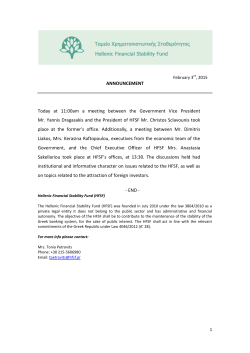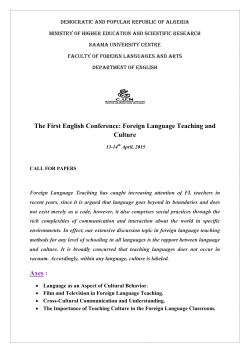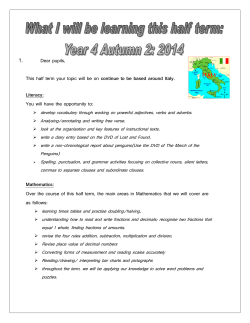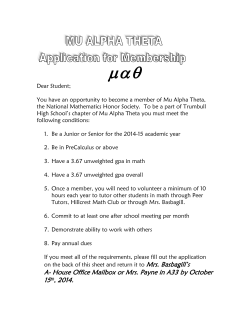
Running Head: DOUBT: AN ETHICAL ANALYSIS OF MRS. MILLER
Running Head: DOUBT: AN ETHICAL ANALYSIS OF MRS. MILLER Doubt: An Ethical Analysis of Mrs. Miller Cheryl J. Servis Virginia Commonwealth University 1 DOUBT: AN ETHICAL ANALYSIS OF MRS. MILLER 2 The 2008 motion picture Doubt presents viewers with a quagmire of difficult ethical dilemmas to contemplate. The film, starring Meryl Streep, Philip Seymour Hoffman, and Amy Adams, is set in a Catholic grade school in the Bronx in 1964. A priest, Father Flynn (Hoffman) is trying to bring both the church and the school into the twentieth century by introducing new ideas and relaxing some of the school’s strict customs and rules. His nemesis, school Principal Sister Aloysius (Streep), believes strongly in the old customs and ferociously maintains the status quo. She presides over the school and the nuns under her direction by creating an atmosphere of fear-driven compliance. The conflict between Father Flynn and Sister Aloysius heightens when a teacher in the school, Sister James (Adams), alerts Sister Aloysius that Father Flynn is paying too much individual attention to Donald Miller, the school’s first African-American student. With no evidence beyond her own “certainty”, Sister Aloysius draws her own conclusion of impropriety and makes it her mission to rid the school of Father Flynn. The remainder of the film traces her actions in her crusade to compel Father Flynn to confess his misdeeds and force him to leave the school. Despite the fact that the behaviors of the three main characters are fraught with questionable ethical actions, it is the behavior and provocative ethical decisions of a secondary character, Mrs. Miller (played by Viola Davis) that most intrigue the author. Mrs. Miller is the mother of Donald Miller, the student with which Father Flynn is accused of being inappropriate. Although Mrs. Miller is only present in three scenes and speaks in only two of them, her choices and her justification for those choices leave the viewer postulating more ethical questions than answers. When confronted by Sister Aloysius with the possibility that Father Flynn has violated her son, Mrs. Miller responds not with shock or dismay, but by pleading for Sister Aloysius to DOUBT: AN ETHICAL ANALYSIS OF MRS. MILLER 3 look the other way. She repeats several times during their discussion that “it is just ‘til June”, meaning that Donald will be moving on the high school if he can just make it until June in the grade school without incident. The unique perspective of Mrs. Miller, the nineteen-sixty’s era mother of an African-American boy who she suspected of being homosexual, and her subsequent controversial decision and attitude with regard to his possible molestation can be reviewed using Starratt’s (2004) Ethics of Critique, Justice, and Care. Starratt’s Ethical Framework Applied to Mrs. Miller Robert Starratt (2004) asserted that school leaders needed a framework with which to make ethical decisions. He describes three frames of ethical decision making: Critique, Justice, and Care. The author postulates that these same frames can be used to analyze the decision made by Mrs. Miller for her son within the school setting. Ethics of Critique Starratt (2004) suggests that within the Ethics of Critique is an awareness that the power, privilege, interest, and influence of the culturally dominant group are reflected in the social and political environment of a society, including schools. Schools tend to reproduce the existing societal conditions of their community. Therefore, it is necessary for school officials to ask themselves who benefits from the current structure and environment of the school. What group dominates the school community? Who defines the cultural structure of the school? What group has an advantage over others within the school walls? Mrs. Miller is keenly aware of the societal conditions of her community and the prejudices faced by her son on a daily basis in school. As the sole African-American student in an all-white Catholic school, her son is ostracized by his peers. He is painfully alone. Believed to be a homosexual student, he is further removed from the comforts of friendship and school DOUBT: AN ETHICAL ANALYSIS OF MRS. MILLER 4 comradery. Mrs. Miller confides to Sister Aloysius that Donald joined the Catholic school two months ago because “they were going to kill him in the public school.” Mrs. Miller understands the heterosexual, Anglo-Saxon biases of her community. What seems like a willingness for her son to be sexually abused by Father Flynn, might simply be a mother’s only choice for keeping her son alive. Does she subject him to isolation, ridicule, and physical assault by his racist and homophobic peers? Or to the possible inappropriate advances of the only other human being who offers him care and support in the daily torture that is his life? Possible death or possible lifelong emotional damage? Mrs. Miller also displays a clear understanding of the hierarchy of both the church and society at large with regard to gender bias. When Sister Aloysius agrees with Mrs. Miller that if in fact the abuse is occurring that the fault would not be Donald’s, Mrs. Miller asks her what she intends to do about it. Mrs. Miller readily points out that Father Flynn is in a position of power over Sister Aloysius and that she knows she will not go “against a man.” Mrs. Miller knows that even a white woman with a position of relative power cannot win against a man, and certainly not a man of higher authority. Ethics of Justice Starratt’s (2004) Ethics of Justice would require that school leaders make decisions that serve both the common good and the individual’s rights. As discussed, Mrs. Miller knows that Donald has few individual rights in the world in which he lives. She pleads with Sister Aloysius to leave her son out of her efforts to remove Father Flynn from the school and church. Whereas Sister Aloysius believes that removing Father Flynn would both serve the common good of the entire school community and the individual rights of Donald by protecting him from the perceived abuse, Mrs. Miller does not recognize justice for her son in actions she fears will put DOUBT: AN ETHICAL ANALYSIS OF MRS. MILLER 5 him into further jeopardy. She shares with Sister Aloysius that her husband, Donald’s father, hates him. His father beat him for what she describes as “the boy’s nature”. She pleads with Sister Aloysius to let the matter drop because this would be all his father needed to proceed to kill him. She begs Sister Aloysius, “you can’t hold a child responsible for what God gave him to be.” In this instance, Mrs. Miller believes the rights of her son to receive an education, move on to high school and college, and be spared from further physical abuse from his father outweighs what Sister Aloysius perceives to be the good of the school community. Ethics of Care Finally, Starratt refers to the Ethics of Care in his decision making framework for school leaders. He submits that the Ethics of Care requires leaders to recognize that what represents justice for one person may not be the same for someone else. It proposes a level of care that honors each individual and desires to see each person live a fully realized life. This framework requires school personnel to consider the uniqueness of each individual involved in a decision and the consequences of that decision on his or her self-esteem, confidence, and ego. Mrs. Miller’s entire dialogue with Sister Aloysius regarding the possibility of an inappropriate relationship between Donald and Father Flynn reflects her use and understanding of this frame of ethical thought. Mrs. Miller knows that Donald’s relationship with Father Flynn is sustaining him in an environment and culture that attacks all that he is or is perceived to be. His school life has gone from physical violence in public school to the point that his mother believed his life was in danger to bullying and ostracism in parochial school. His home life, what should be his place of love and protection, includes physical violence and loathing from his father. In these circumstances, Mrs. Miller believes the comfort Donald finds in his relationship with Father Flynn, even if it is inappropriate in nature, supersedes any ethical necessity to stop DOUBT: AN ETHICAL ANALYSIS OF MRS. MILLER 6 the interaction. From her frame as his mother, justice for Donald includes his physical safety, his educational opportunity, and the small morsel of happiness provided him by Father Flynn. Justice for a white, heterosexual boy in the same circumstances might be completely different, but in this moment, Mrs. Miller is clear about what she most desperately wants for her son. She wants him to have a chance. A chance at a life beyond the misery of his youth. Conclusion While most people would look at Mrs. Miller’s comments to Sister Aloysius about the relationship between her son and Father Flynn with dismay and possibly disgust, it serves as a poignant reminder of the vast differences in perspectives and personal realities amongst people in the same community. It is difficult to imagine a situation in which possible sexual abuse is the lesser of two evils. However, as school leaders, we must strive to be aware of the different cultures, backgrounds, and situations that influence the ethical and decision making frameworks of our students, parents, and faculty. We must acknowledge the frame created by the bureaucracy of our school as we make decisions that affect others (Ethics of Critique), preserve our commitment to serving the common good and the rights of the individuals in our schools (Ethics of Justice), and recognize that what is just for one person may not adequately respect the personal situation of another (Ethics of Care). As school leaders, we must be able to make and respect decisions that are made from many ethical perspectives. A daunting, but immensely important task, in the education and guidance of those entrusted to our care. DOUBT: AN ETHICAL ANALYSIS OF MRS. MILLER References Rudin, S. (Producer), & Shanley, J. P. (Director). (December 25, 2008). Doubt [Motion picture]. USA: Miramax. Starratt, R. J. (2004). Ethical leadership. San Francisco: John Wiley & Sons. 7
© Copyright 2025









